
Related
Topics
Guests
- Neha Dixitindependent journalist based in New Delhi, India. Her investigative reporting focuses on politics, gender and social justice. Recipient of the 2019 International Press Freedom Award from the Committee to Protect Journalists.
- Priya Gopaluniversity lecturer in the Faculty of English at the University of Cambridge and the author of Insurgent Empire: Anticolonial Resistance and British Dissent.
In India, the death toll from anti-Muslim violence in Delhi has risen to at least 34, with police accused of turning a blind eye to assaults on Muslims committed by Hindu nationalist mobs. The violence began Sunday, when groups of Hindus attacked peaceful sit-ins of Muslims protesting against Hindu nationalist Prime Minister Narendra Modi’s new citizenship law, which widely restricts Muslim immigration to India. Modi said nothing as the violence continued for days, instead hosting President Donald Trump on a two-day state visit in which Trump heaped praise on the Indian prime minister. We speak with Neha Dixit, independent Indian journalist, and Priya Gopal, lecturer at the University of Cambridge and author of “Insurgent Empire: Anticolonial Resistance and British Dissent.”
Transcript
AMY GOODMAN: This is Democracy Now! I’m Amy Goodman, as we go now to India, where the death toll from anti-Muslim violence in Delhi has risen to at least 34, with police accused of standing by as Hindu nationalist mobs assault Muslims. The violence began Sunday when groups of Hindus attacked peaceful sit-ins of Muslims protesting against Hindu nationalist Prime Minister Narendra Modi’s new citizenship law, which widely restricts Muslim immigration to India. This is Mohammad Zubair, who said he was on his way home from a local mosque in northeast New Delhi when he was attacked by a mob.
MOHAMMAD ZUBAIR: [translated] Twenty to 25 people started beating me. The rest were standing by as if they were watching a show. There were thousands behind them. They kept hitting me. Nobody came forward to save me. Somehow, some people came from the other side. I was like unconscious. I didn’t have much consciousness. My clothes were drenched in blood.
AMY GOODMAN: Prime Minister Modi said nothing as the violence continued for days, instead hosting President Donald Trump on a two-day state visit in which Trump heaped praise on the Indian prime minister. This is Trump speaking about Modi at a news conference back in Washington Wednesday.
PRESIDENT DONALD TRUMP: He’s a great gentleman, a great leader. It’s an incredible country. We were treated very, very well. And we really enjoyed it. A lot of tremendous progress was made in terms of relationship. Our relationship with India is extraordinary right now. And we’re going to be doing a lot of business with India. They’re sending billions and billions of dollars now to the United States.
AMY GOODMAN: On Sunday, human rights lawyer Arjun Sethi called Modi and Trump the “worst kind of fascists.” He tweeted, “[B]oth Modi & Trump have criminalized minority communities, championed fake news & persecuted dissent, promoted supremacist ideologies, and played on the racism & anxiety of dominant communities,” unquote.
Modi broke his silence Wednesday, calling for peace on Twitter. But many critics have noted the Indian prime minister served as the chief minister of Gujarat when one of India’s worst anti-Muslim riots took place in 2002 that left at least a thousand people dead. After the bloodshed, the U.S. State Department revoked Modi’s visa, saying it could not grant a visa to any foreign government official who was, quote, “responsible for or directly carried out, at any time, particularly severe violations of religious freedom,” unquote. Modi has never apologized for or explained his actions at the time.
Well, for more, we’re joined by two guests. From Democracy Now! video stream in New Delhi, Neha Dixit is with us, independent journalist based there. Her investigative reporting focuses on politics, gender and social justice; recipient of the 2019 International Press Freedom Award from the Committee to Protect Journalists. And in Ithaca, New York, speaking to us from Cornell University, Priya Gopal, who’s on the Faculty of English at the University of Cambridge in Britain, author of Insurgent Empire: Anticolonial Resistance and British Dissent.
We welcome you both to Democracy Now! Let’s begin with Neha Dixit in New Delhi. Tell us what has happened there. In the wake of President Trump’s trip, what took place in New Delhi?
NEHA DIXIT: Thank you, Amy. In the last three days, we’ve seen a spell of violence in various parts of New Delhi, especially in the northeastern district. As of now, the death toll has gone up to 34, but people are still in the process of finding dead bodies everywhere and finding — raising the official count.
What happened on Sunday was that a lot — since December 2019, several people across the national capital have been protesting against the Citizenship Amendment Act that was passed. A lot of these protests had been led by Muslim women and with the participation of various other communities against this law that excludes Muslims. So, on Sunday night, a pro-CAA group, pro-Citizenship Amendment Act group, which was led by a member of the Bharatiya Janata Party, the BJP, which is also Narendra Modi’s party, they came there. This BJP member called Kapil Mishra, who is also a former MLA of the area, member of Legislative Assembly in Delhi, he incited violence. There’s evidence of that, saying that the protesters should move and go back. And it is from Sunday night ’til yesterday evening, the violence continues. Lots of schools, offices [inaudible]. Most of these are working-class Muslim areas. A large mob has been reported in various parts, stone pelting, using tear gas, using petrol bombs. And all this happened in the presence of police. There have been several videos that show that the police is standing while this kind of violence is being meted out by the mob on the people in these neighborhoods.
The other thing also happened was that this is the first time — yesterday I’ve seen, I met several people who were injured. Apart from petrol bombs and guns and tortures, acid was used on several people, so which is why lots of people have lost their eyes, have had damaged faces. Again, each time somebody tried to stop the mob from attacks, the police did not help them, instead stood as bystanders. Also, the police also joined at several places to raise Hindu slogans, such as “Jai Shri Ram.”
So, this has been the situation the last three days. Thirty-four people who have been killed, the bodies are still at the hospitals. The postmortems are still conducted. But lack of government support, lack of administrative support has led to no timely treatment for the people who have been injured. And this has been growing for the last two-and-a-half months, since the government passed the Citizenship Amendment Act, because it exclusively is meant to keep out the Muslim community in the country. And while these protests were resorting to nonviolence and constitutionalism clearly, this kind of violence was used. And not just the — various kinds of hate speeches have been used in the recent Delhi elections also. And it has created an atmosphere by the silence of the prime minister, under whose jurisdiction, under the central government, under whose — the police, the Delhi police, is under, that anybody who raises right-wing Hindu nationalist slogans or takes their agenda forward on the road enjoy impunity and are encouraged by this kind of silence from Modi and the other ministers.
AMY GOODMAN: And can you tell me, Neha, is this in any way — what just happened in New Delhi, is it related to President Trump being there and then being in Gujarat and 100,000 people for this “Namaste Trump” rally, in answer to Trump going to Houston and welcoming Modi at that “Howdy Modi” rally?
NEHA DIXIT: I would definitely say that the kind of Islamophobia that we have seen in the recent past, in the last few years, in India is also kind of encouraged by President Trump in the way he has treated the minorities everywhere else. This kind of Islamophobia is encouraged by this kind of silence also from President Trump, because he was asked a question during the press conference, and he did not respond to it. So there is a clear connection. Also the fact that these elements are emboldened by the visits of somebody like Trump, and recently we also had Bolsonaro, President Bolsonaro from Brazil, who kind of shares similar principles when it comes to minorities, when it comes to climate, when it comes to various other policies that leads to displacement. And when there is no reaction from them, and in fact they’re seen as endorsing Prime Minister Modi in India, there is a kind of encouragement for such things here.
I would also like to say that this is the first time — not the first time, but I would say we have not heard in the recent past where journalists in the last three days were actually attacked by mobs in the presence of police, and they were asked for their religions. So, several non-Hindu journalists were threatened. They were forced to delete their videos, forced to delete photos. They were brutally attacked. Some of the Hindu journalists had to identify and say Hindu prayers so that they’re let off by the mob. And this is unprecedented. And in this kind of a situation now, even reporting what is happening with a certain community has become such a problem.
The other thing that happened was that lots of people who were injured and were in small nursing homes and needed better facilities and needed to be transferred to bigger hospitals, ambulances were not allowed by the police to enter, so which is why on Tuesday midnight some of the members of the civil society tried to contact the High Court. And the High Court, at midnight, [inaudible] they passed an order saying that ambulances should be immediately allowed by the Delhi police, including several other things. Also, one of the judges, who said that Delhi should not become like a 1984 situation. In 1984, several — Delhi witnessed a genocide of the Sikh community. And today, we hear that that judge has been also transferred. So I also want to point out that the institutions, the police, the judiciary and the other people in the administration who are supposed to protect the constitutional rights of people in India, in a secular India, are also under grave threat, under the political pressure right now.
AMY GOODMAN: I want to bring in Priya Gopal to this discussion. You’re now in Ithaca at Cornell University. Your Twitter thread has been extremely significant in saying we have to reshape the framework that this is being seen in around the world and the language that’s being used. Please explain, Professor Gopal.
PRIYA GOPAL: Well, I think that we have to drop the language of clashes and even riots and communal violence. A lot of the language, certainly in the British press, and I think in the American press, as well, has been presenting this as a conflict between equal and opposite sides, as a kind of religious fight. It is not a religious fight. We are witnessing a situation of very deep structural violence. There is a majoritarian supremacist party in power in India. And mobs, directly incited by senior Indian politicians, are roaming around in Muslim-majority areas, identifying Muslim shops, businesses, homes, setting them on fire, identifying Muslims, beating them up. There is some pushback, certainly, as you might expect, but this is not a situation of equality. And I’ve said that any press outfit which refers to this as “clashes,” clashes between Hindus and Muslims, or even as kind of riots, is actually culpable of a dereliction of duty, and certainly of critical analysis.
This is not a situation where equal and opposite forces are in conflict. It’s not even a civil war. What we have is a very dangerous supremacist ideology that is now out on the streets. And I’m afraid that the parallels with 1930s Germany are extremely clear. What has taken place in Delhi in the last couple of days is comparable to the Reichskristallnacht, when Jewish businesses were attacked and set on fire. And I think that the world really needs to wake up to the gravity of the situation in India, because we are in a situation not unlike what was happening in Germany in the 1930s, in its 21st century variation. But I think that to just play this out as conflicts and clashes and religious fights, I think, is deeply irresponsible.
AMY GOODMAN: And President Trump paying homage to Mahatma Gandhi and at the same time hailing his $3 billion military helicopter deal with Modi, the significance of Trump’s relationship with Modi? We just have 30 seconds.
PRIYA GOPAL: Well, I’m afraid that, you know, Modi has to be set in the context of the global rise of ethnonationalism. Trump is a kind of apprentice to Modi, rather than the other way around. Trump, I think, watches the situation in India and probably sees this as really a fantasy come true. The using of Gandhi to sanitize what is happening in India is now an old story, and Trump is simply picking up the narrative that has already been peddled by the Indian state. But this is not Gandhi’s India by a longshot. What we have here is violent supremacism out on the streets of India. And if the world doesn’t take notice, then, like the coronavirus, this is also going to spread, and we will all pay the price.
AMY GOODMAN: Priya Gopal, I want to thank you for being with us, lecturer at the University of Cambridge, and Neha Dixit, an independent journalist based in New Delhi, India. And of course we’ll continue to follow this study.
Tune in next Tuesday night for Democracy Now!’s Super Tuesday live special broadcast with The Intercept, starting at 7 p.m. Eastern time until midnight, right here at democracynow.org and on many stations around the country.
We have job openings at Democracy Now!, from producer to producing fellow to communications director and more. Go to democracynow.org. I’m Amy Goodman. Thanks for joining us.

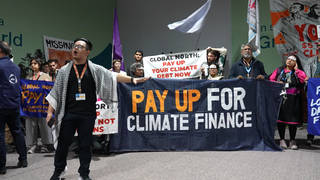
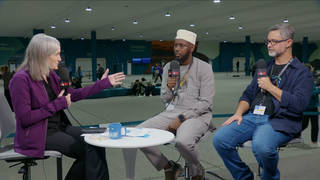
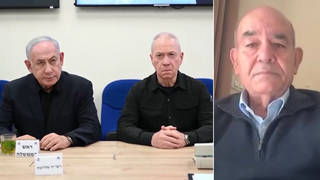
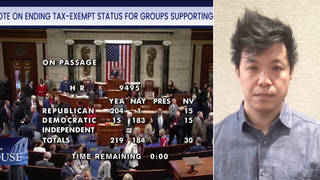





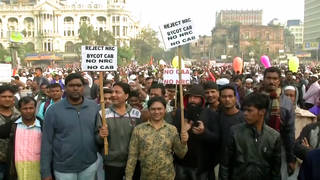
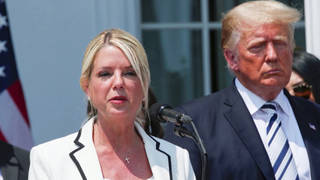
Media Options